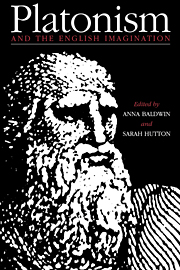Book contents
- Frontmatter
- Contents
- Notes on contributors
- Preface
- I ANTIQUITY
- II THE EARLY CHRISTIAN PERIOD AND THE MIDDLE AGES
- 2 Introduction
- 3 The Christian Platonism of St Augustine
- 4 Boethius and King Alfred
- 5 Chaucer's use of Neoplatonic traditions
- 6 Platonism in the Middle English Mystics
- III THE RENAISSANCE AND THE SEVENTEENTH CENTURY
- IV THE EIGHTEENTH CENTURY
- V THE NINETEENTH CENTURY
- VI THE TWENTIETH CENTURY
- Bibliography
- Index
4 - Boethius and King Alfred
Published online by Cambridge University Press: 15 December 2009
- Frontmatter
- Contents
- Notes on contributors
- Preface
- I ANTIQUITY
- II THE EARLY CHRISTIAN PERIOD AND THE MIDDLE AGES
- 2 Introduction
- 3 The Christian Platonism of St Augustine
- 4 Boethius and King Alfred
- 5 Chaucer's use of Neoplatonic traditions
- 6 Platonism in the Middle English Mystics
- III THE RENAISSANCE AND THE SEVENTEENTH CENTURY
- IV THE EIGHTEENTH CENTURY
- V THE NINETEENTH CENTURY
- VI THE TWENTIETH CENTURY
- Bibliography
- Index
Summary
BOETHIUS
Any generalisation about the knowledge of Greek texts in medieval England is fraught with danger. However, it would appear that during the first half of that period acquaintance with the works of Plato was at second or even third hand, through the writings of authors such as Macrobius, Martianus Capella, Augustine, Boethius and (via Calcidius' translation of the Timaeus) John Scotus Eriugena,and through Latin and Old English texts drawing on one or other of these writings. The most important contribution in the vernacular was provided by the late ninth century reworking of Boethius' De consolatione Philosophiae by Alfred, King of Wessex, though Platonic or Neoplatonic ideas are also found in Alfred's Soliloquies (by way of Augustine) and in a couple of Old English homilies (by way of Alfred's Boethius). The earliest secure evidence for knowledge of the Consolatio in England is provided by Alfred's Boethius, although, thanks apparently to the Englishman Alcuin, it was being read on the continent from the Carolingian Renaissance onward. The works of Macrobius and Martianus Capella had also become known in England by the end of the ninth century, while commentaries on Capella and Boethius were in circulation there by the beginning of the tenth.
In the later medieval period, Calcidius' Timaeus was joined by the twelfth–century Latin translations of the Meno and the Phaedo by Henricus Aristippus (d.1162). However, the importance of patristic and other major authors writing in Latin as transmitters of Platonic thought remained undiminished, with the Consolatio playing a key role. As in the earlier period, this text exerted its influence both directly (in the original or in translation) and through commentaries.
- Type
- Chapter
- Information
- Platonism and the English Imagination , pp. 38 - 44Publisher: Cambridge University PressPrint publication year: 1994
- 3
- Cited by



